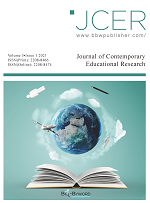Abstract
This paper describes a half-year in-service Language Teacher Education (LTE) program, targeting the trainee teachers who work in Chinese private English institutes. This is to better prepare them at the outset of their career. Primarily intending to build the trainee teachers’ professionalism and raise their awareness, an overall illustration of adopted training courses and choice of activities are introduced in this paper. Focusing on integrating instructional knowledge from ESL and English language teaching, the LTE program schedule will allow majority of readers to implement during their daily teaching and research activities. Principles underpinning this program design are illustrated one by one. A course like this may not foster all teachers to become professionals at once, but to be a reflective practitioner can be a reachable goal, as accumulation of professional expertise is based on teachers’ capability of understanding how to reflect on teaching.
References
Borg S, 2009, Language Teacher Cognition. In Burns, A. and Richards, J. C. (Eds) The Cambridge Guide to Second Language Teacher Education. Cambridge: Cambridge University Press.
Burton J, 2009, Reflective Practice. In Burns, A. and Richards, J. C. (Eds) The Cambridge Guide to Second Language Teacher Education. Cambridge: Cambridge University Press.
Canagarajah AS, 1999, Resisting Linguistic Imperialism in English Teaching. Oxford: Oxford University Press.
Darling-Hammond L, Lieberman A, 2012, Teacher Education Around the World: Changing Policies and Practices. London: Routledge.
Freeman D, Johnson KE, 1998, Reconceptualizing the Knowledge-base of Language Teacher Education. TESOL Quarterly, 32 (3), 397-417.
Gray J, Block D, 2012, The Marketization of Language Teacher Education and Neoliberalism: Characteristics, Consequences and Future Prospects. In Block, D., Gray J and Holborow M, (Eds) Neoliberalism and Applied Linguistics. London: Routledge.
Graves K, 2009, The Curriculum of Second Language Teacher Education. In Burns A, and Richards JC, (Eds) The Cambridge Guide to Second Language Teacher Education. Cambridge: Cambridge University Press.
Hayes D, 2005, Exploring the Lives of Non-native Speaking English Educators in Sri Lanka. Teachers and Teaching: Theory and Practice, 11 (2), 169-94.
Johnson KE, 1994, The Emerging Beliefs and Instructional Practices of Pre-service ESL Teachers. Teaching and Teacher Education, 10, 439-52.
Johnson K, 2000, Innovations in TESOL Teacher Education: A Quiet Revolution. In Johnson K, (Ed) Teacher Education: Case Studies in Teacher Practice Series. Alexandria, VI: TESOL.
Johnston B, 2009, Collaborative Teacher Development. In Burns, A. and Richards, J. C. (Eds) The Cambridge Guide to Second Language Teacher Education. Cambridge: Cambridge University Press.
Johnston K, 2014, Forward. In Said, S. B. and Zhang, L. J. (Eds) Language Teachers and Teaching: Global Perspectives, Local Initiatives. New York: Routledge.
Kumaravadivelu B, 2001, Toward a Post-method Pedagogy. TESOL Quarterly, 35 (4), 537-60.
Lee E, Lew L, 2001, Diary Studies: The Voices of Nonnative English Speakers in a Master of Arts Program in Teaching English to Speakers of Other Languages. The CATESOL Journal, 13 (1), 135-49.
Morita N, 2000, Discourse Socialization Through Oral Classroom Activities in a TESL Graduate Program. TESOL Quarterly, 34 (2), 279-310.
